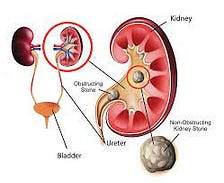Introduction:
Dealing with kidney stones can be a painful and distressing experience. Fortunately, advancements in medical science have provided a range of treatment options to alleviate discomfort, facilitate stone passage, and prevent recurrence. In this blog post, we’ll explore the various treatment modalities available for kidney stones, from conservative measures to minimally invasive procedures, empowering individuals with knowledge to make informed decisions about their healthcare.

1. Conservative Management:
For small kidney stones that are likely to pass spontaneously, conservative management may be the initial approach. This typically involves:
- Pain Management: Over-the-counter or prescription pain medications, such as nonsteroidal anti-inflammatory drugs (NSAIDs) or opioids, may be prescribed to relieve pain associated with kidney stones.
- Hydration: Increasing fluid intake, particularly water, can help flush out the urinary system and facilitate the passage of small stones.
- Observation: In some cases, healthcare providers may recommend a watchful waiting approach, monitoring the progress of the stone while managing symptoms.
2. Medications:
Certain medications may be prescribed to aid in the management of kidney stones or to address underlying conditions contributing to stone formation. These medications include:
- Alpha-blockers: Drugs like tamsulosin can help relax the muscles in the ureter, facilitating the passage of kidney stones.
- Pain relievers: Medications such as ibuprofen or acetaminophen may be used to alleviate discomfort associated with kidney stones.
- Medications to prevent stone formation: Depending on the composition of the stone and underlying metabolic factors, medications may be prescribed to prevent the formation of new stones or reduce the risk of recurrence.
3. Extracorporeal Shock Wave Lithotripsy (ESWL):
ESWL is a non-invasive procedure that uses shock waves to break kidney stones into smaller fragments, making them easier to pass through the urinary tract. During the procedure, the patient lies on a table while a machine delivers shock waves to the targeted stone. ESWL is most effective for small to medium-sized stones located in the kidney or upper ureter.
4. Ureteroscopy with Laser Lithotripsy:
Ureteroscopy involves passing a thin, flexible scope (ureteroscope) through the urethra and bladder into the ureter to directly visualize and access the stone. Once the stone is located, a laser fiber is used to fragment the stone into smaller pieces, which can then be removed or allowed to pass naturally. Ureteroscopy is particularly effective for stones located in the lower ureter or those resistant to other treatment modalities.
5. Percutaneous Nephrolithotomy (PCNL):
PCNL is a minimally invasive surgical procedure used to remove large or complex kidney stones. During PCNL, a small incision is made in the back, and a nephroscope is inserted directly into the kidney to visualize and fragment the stone. The fragmented stones are then removed using specialized instruments or suction. PCNL is typically reserved for larger stones or cases where other treatments have been unsuccessful.
Conclusion:
The treatment of kidney stones is tailored to the individual patient’s characteristics, including the size, location, and composition of the stones, as well as their overall health and preferences. From conservative measures like pain management and hydration to more advanced interventions such as lithotripsy and surgical procedures, there are multiple options available to effectively manage kidney stones and improve patient outcomes. By working closely with healthcare providers to explore the various treatment modalities and develop personalized treatment plans, individuals can navigate the journey of kidney stone management with confidence and comfort.
Comments
Post a Comment